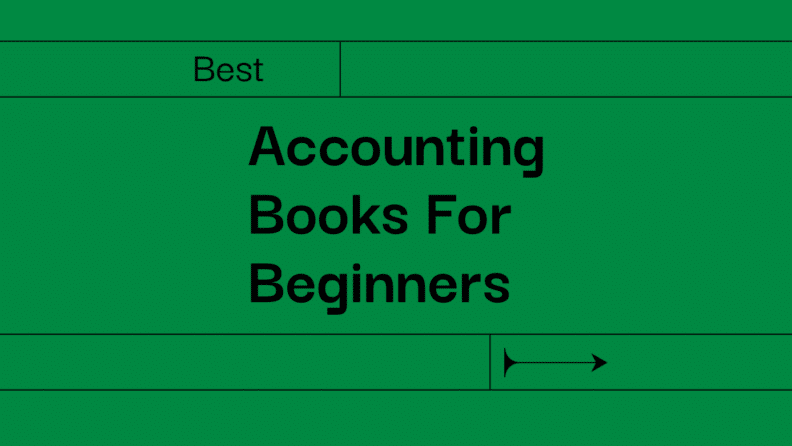Navigating the realm of accounting, with its vast landscape from GAAP to the accounting equation, can seem daunting.
With that said, the process doesn't have to be complicated; if you want to understand accounting, here's where you should start.
Whether you're looking for the basics of accounting - like depreciation and double-entry - or advanced topics such as financial ratios and cap table management, these accounting books for beginners should have something for you.
For top-notch financial strategies, these best finance books are essential reading.
17 Best Accounting Books for Beginners
These books were hand-picked for this, as they address the challenges beginners face in accounting.
- Accounting Made Simple: Accounting Explained in 100 Pages or Less by Mike Piper
- The Accounting Game: Learn the Basics of Financial Accounting - As Easy as Running a Lemonade Stand by Darrell Mullis and Judith Orloff
- Barron's Accounting Handbook by Joel G. Siegel Ph.D. and Jae K. Shim Ph.D.
- Warren Buffett Accounting Book: Reading Financial Statements for Value Investing by Stig Brodersen and Preston Pysh
- Financial Statements: A Step-by-Step Guide to Understanding and Creating Financial Reports by Thomas Ittelson
- Cost Accounting For Dummies by Kenneth W. Boyd
- Accounting for the Numberphobic: A Survival Guide for Small Business Owners by Dawn Fotopulos
- Accounting for Non-accountants: The Fast and Easy Way to Learn The Basics by Wayne Label
- Accounting QuickStart Guide: The Simplified Beginner's Guide to Financial & Managerial Accounting For Students, Business Owners, and Finance Professionals by Josh Bauerle CPA
- Small Business Financial Management Kit For Dummies by Tage C. Tracy and John A. Tracy
- Accounting 101: The ultimate guide to financials that every business owner should master! by Peter Oliver
- Accounting Fundamentals: A Non-Finance Manager's Guide to Finance and Accounting by Shihan Sheriff
- Accounting for Value by Stephen Penman
- Financial Shenanigans, Fourth Edition: How to Detect Accounting Gimmicks and Fraud in Financial Reports by Howard Schilit, Jeremy Perler, and Yoni Engelhart
- Bookkeeping All-in-One For Dummies by Lita Epstein and John A. Tracy
- Accounting Best Practices by Steven M. Bragg
- Profit First: Transform Your Business from a Cash-Eating Monster to a Money-Making Machine by Mike Michalowicz
Overviews Of The 17 Best Accounting Books for Beginners
Here’s a quick summary of each book, what you’ll learn, why you should read it, and a quote I like from each book.
Plus - if you're a mega keener - I added the author’s LinkedIn and other places to connect with them online.
1. Accounting Made Simple: Accounting Explained in 100 Pages or Less by Mike Piper
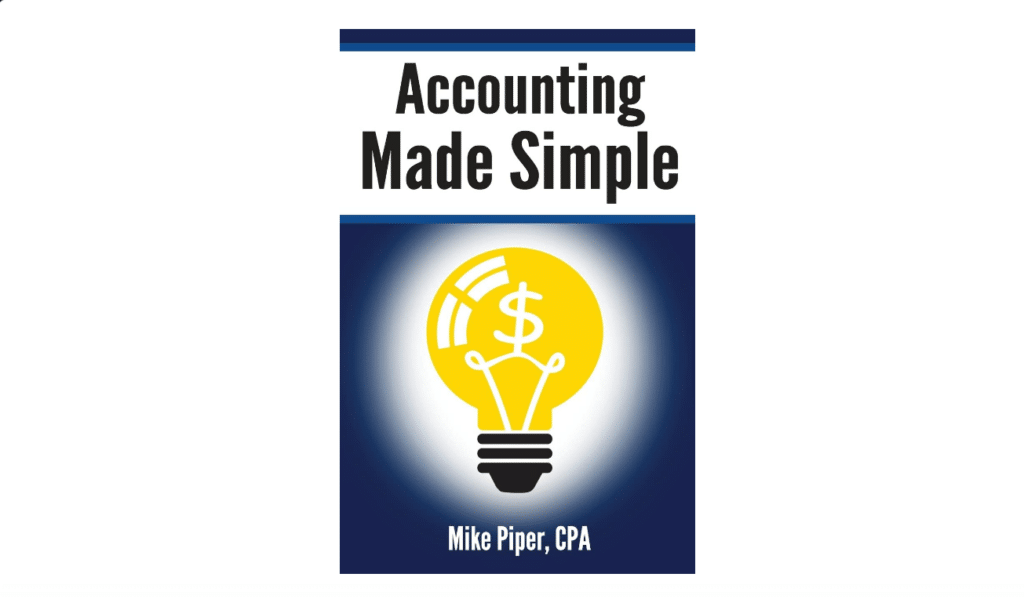
Summary:
In Accounting Made Simple, Mike Piper offers a distilled tour of accounting principles. Written with clarity and conciseness, Piper successfully demystifies the realm of accounting, making it approachable even for those without a financial background.
What You'll Learn:
Readers will gain insights into basic accounting concepts and terms, interpret balance sheets, understand the dynamics of debits and credits, and navigate the intricacies of taxes and financial statements.
Why You Should Read It:
This book is perfect for those who are seeking a clear and quick introduction to accounting. Within just a few hours, readers will acquire a foundational understanding of accounting principles and practices.
Quote From The Book:
“Understanding accounting can help you make better decisions and have a clearer picture of the financial health of your business or investments.”
About The Author:
Mike Piper is a recognized figure in the world of accounting, particularly known for his ability to simplify intricate financial concepts for a broader audience. He has built a commendable reputation as both an accountant and an author. You can connect with Mike on platforms like Twitter and his personal website. Explore more about his works on his Amazon portfolio.
2. The Accounting Game: Learn the Basics of Financial Accounting - As Easy as Running a Lemonade Stand by Darrell Mullis and Judith Orloff
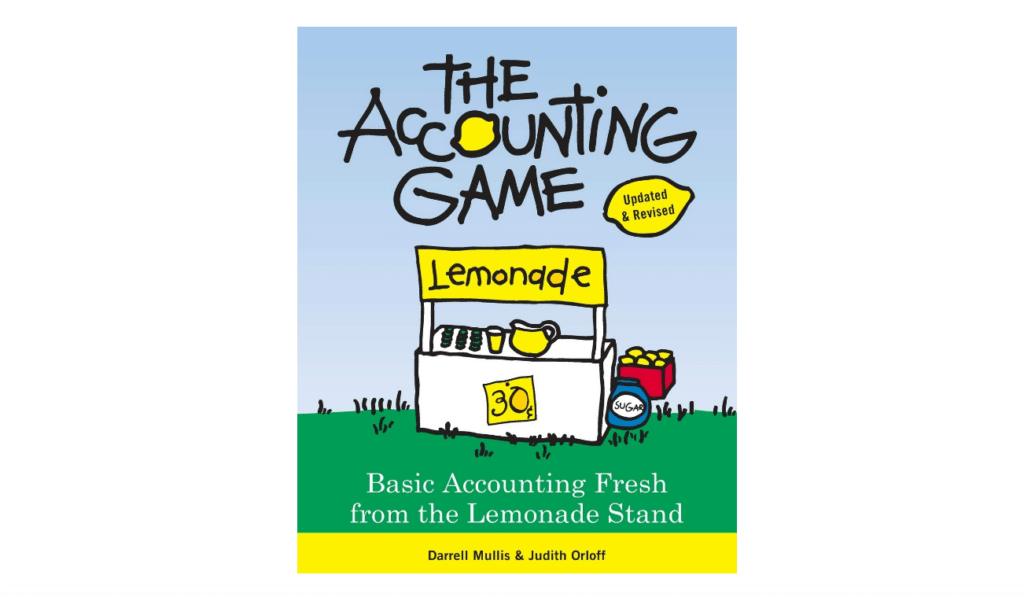
Summary:
The Accounting Game is not your ordinary accounting book. Mullis and Orloff creatively utilize the metaphor of a lemonade stand to make accounting both engaging and comprehensible. It's an interactive learning journey that transforms accounting from mundane to exciting.
What You'll Learn:
The book encapsulates the core principles of accounting, demonstrating the tangible connection between financial statements and daily business operations. It also offers tools and techniques to analyze business data effectively.
Why You Should Read It:
If you've been put off by conventional accounting textbooks, this innovative and interactive approach will reignite your interest, offering a fresh and playful perspective on financial accounting.
Quote From The Book:
“Every business is a game, and accounting is the scorecard.”
About The Author:
Darrell Mullis and Judith Orloff have collaborated to reshape the traditional way accounting is presented. Their combined expertise has produced a work that is both educational and entertaining. Connect with Darell on LinkedIn, and engage with Judith's expertise on LinkedIn and Twitter.
3. Barron's Accounting Handbook by Joel G. Siegel Ph.D. and Jae K. Shim Ph.D.
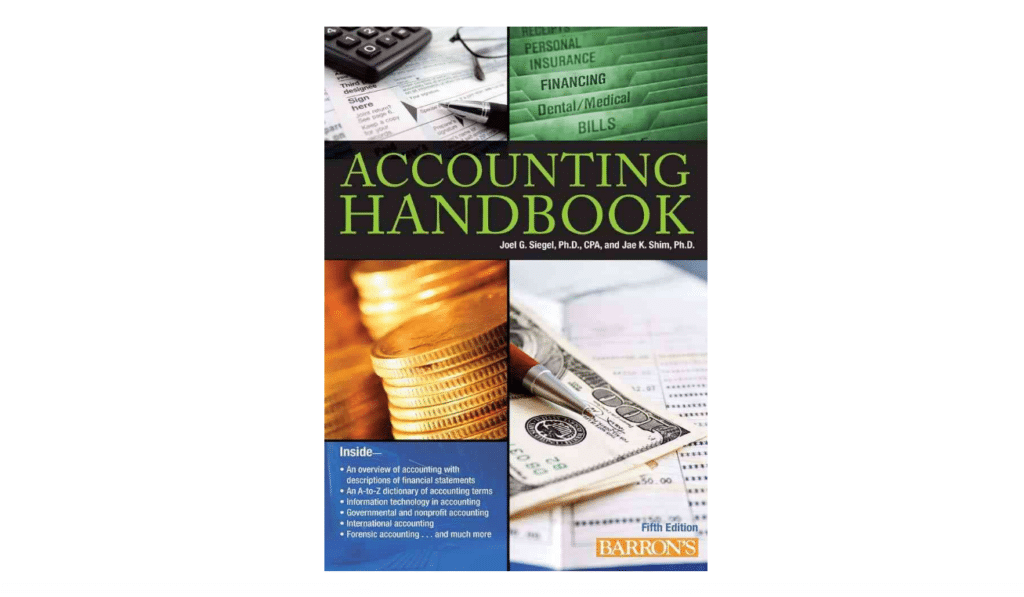
Summary:
Barron's Accounting Handbook is a robust reference, encompassing an expansive coverage of accounting rules, standards, and practices. Drs. Siegel and Shim have created a work that dives into the depth of accounting, making it indispensable for both novices and seasoned professionals.
What You'll Learn:
The book provides a comprehensive analysis of accounting theories, offers updates on International Financial Reporting Standards (IFRS), and elucidates techniques specific to managerial and cost accounting.
Why You Should Read It:
For those in the financial domain, this book serves as an invaluable resource. Whether you're a student or a professional, the book ensures that you're abreast of the latest in the accounting world.
Quote From The Book:
“Accounting is not just about numbers; it's about understanding the story behind them.”
About The Author:
Joel G. Siegel Ph.D. and Jae K. Shim Ph.D. are esteemed figures in the academic and professional world of accounting. They have both made significant contributions to the field through their teachings, research, and writings. Their depth of knowledge is showcased in this comprehensive guide.
4. Warren Buffett Accounting Book: Reading Financial Statements for Value Investing by Stig Brodersen and Preston Pysh
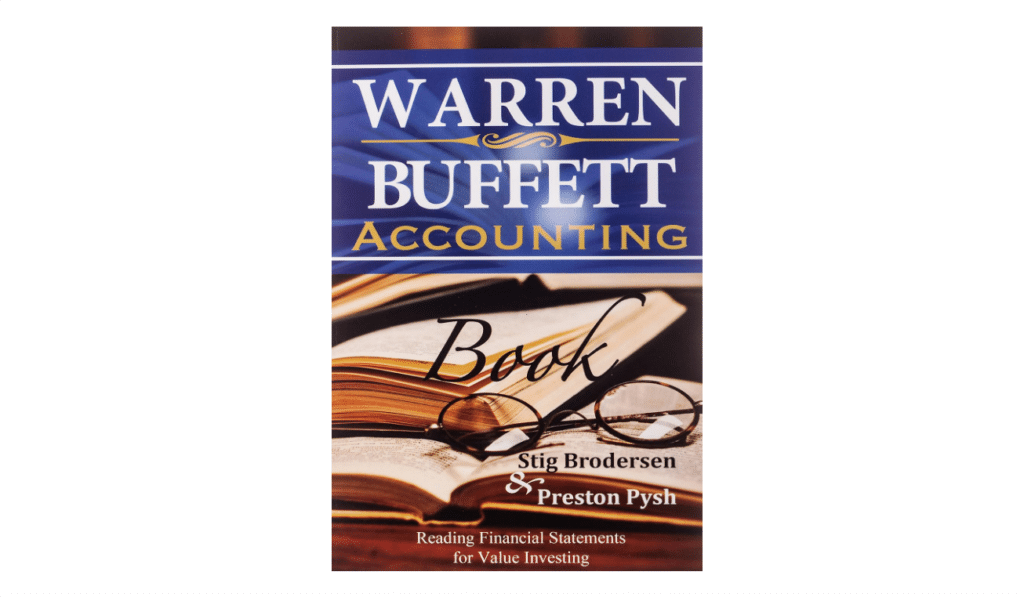
Summary:
Diving into the mindset of the investment maestro, Brodersen and Pysh unravel the accounting methods that guide Warren Buffett's investment strategies. By simplifying complex concepts, the authors illuminate the path to understanding financial statements from the perspective of value investing.
What You'll Learn:
Uncover the nuances of balance sheets, income statements, and cash flow statements. Learn to interpret these documents as Warren Buffett does, focusing on long-term value and sustainability.
Why You Should Read It:
If you aspire to think like Warren Buffett when assessing investments, this guidebook demystifies the accounting practices that underlie his success.
Quote From The Book:
"Good investing is much more about the understanding of businesses and what makes them tick than understanding complex accounting details."
About The Author:
Stig Brodersen and Preston Pysh are celebrated for their insights into value investing. Their comprehensive research and adept communication skills have made them prominent figures in the financial community. Engage with Stig further on LinkedIn and Twitter. Connect with Preston on LinkedIn and Twitter.
5. Financial Statements: A Step-by-Step Guide to Understanding and Creating Financial Reports by Thomas Ittelson
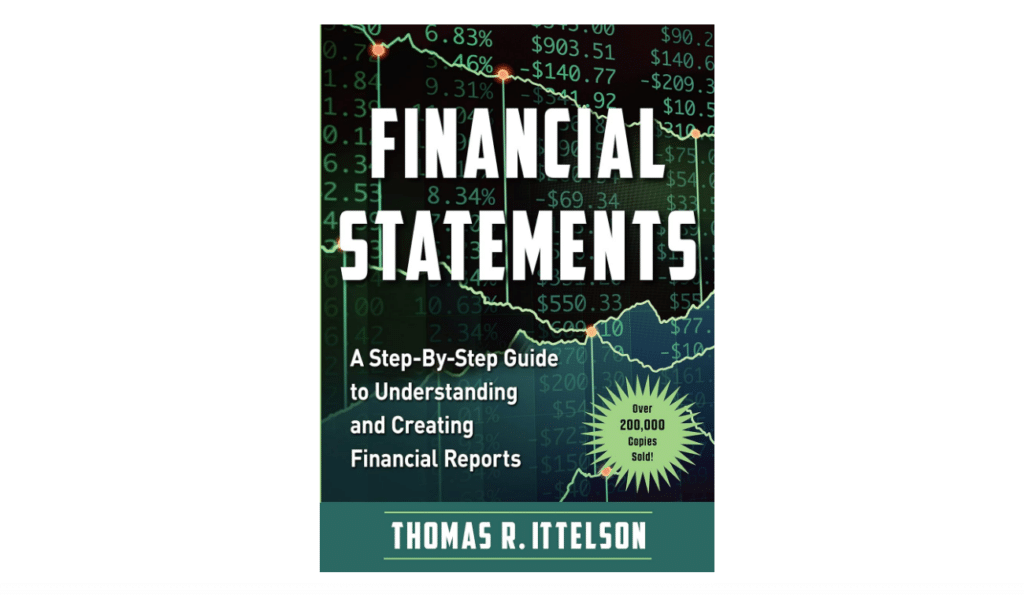
Summary:
Ittelson provides a clear, step-by-step guide to financial reports. Through simple language and illustrative examples, he unravels the intricacies of financial documentation, making them accessible to readers of all backgrounds.
What You'll Learn:
Master the art of creating and interpreting the three major financial statements: the income statement, balance sheet, and statement of cash flows.
Why You Should Read It:
Whether you're a business owner, student, or professional, Ittelson's guide serves as a foundational resource for grasping the essentials of financial reporting.
Quote From The Book:
"Financial statements are the heartbeat of a business, revealing its health and vitality."
About The Author:
Thomas Ittelson is an expert in financial reporting and a seasoned author. With a passion for making complex topics accessible, he's contributed significantly to financial literacy. Connect with Thomas on his LinkedIn profile.
6. Cost Accounting For Dummies by Kenneth W. Boyd
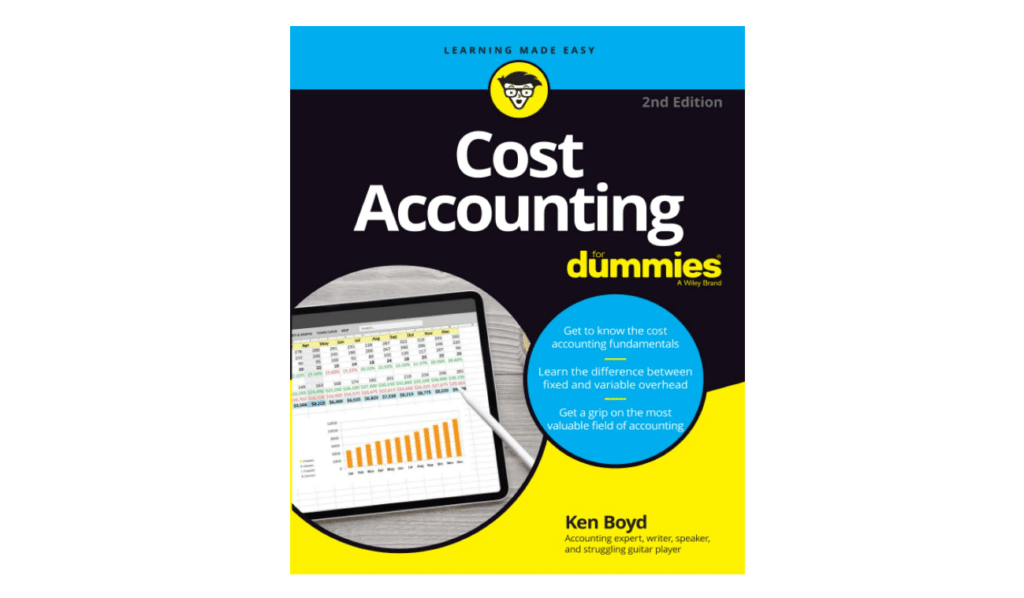
Summary:
In this installment of the popular "For Dummies" series, Boyd elucidates the complex world of cost accounting. With practical insights and relatable examples, he aids readers in understanding the intricacies of costing methods, budgeting, and performance evaluation.
What You'll Learn:
Grasp the core concepts of cost accounting, from overhead costs to variable and fixed expenses, and understand how to utilize them in business decision-making.
Why You Should Read It:
Whether you're studying accounting, running a business, or just looking to boost your financial acumen, this book offers a straightforward introduction to cost accounting.
Quote From The Book:
"Cost accounting provides the tools to evaluate whether you're making a profit."
About The Author:
Kenneth W. Boyd brings a wealth of knowledge in accounting and financial management. An educator at heart, he's dedicated to breaking down complex financial topics for a wider audience. Engage with Kenneth on LinkedIn.
7. Accounting for the Numberphobic: A Survival Guide for Small Business Owners by Dawn Fotopulos
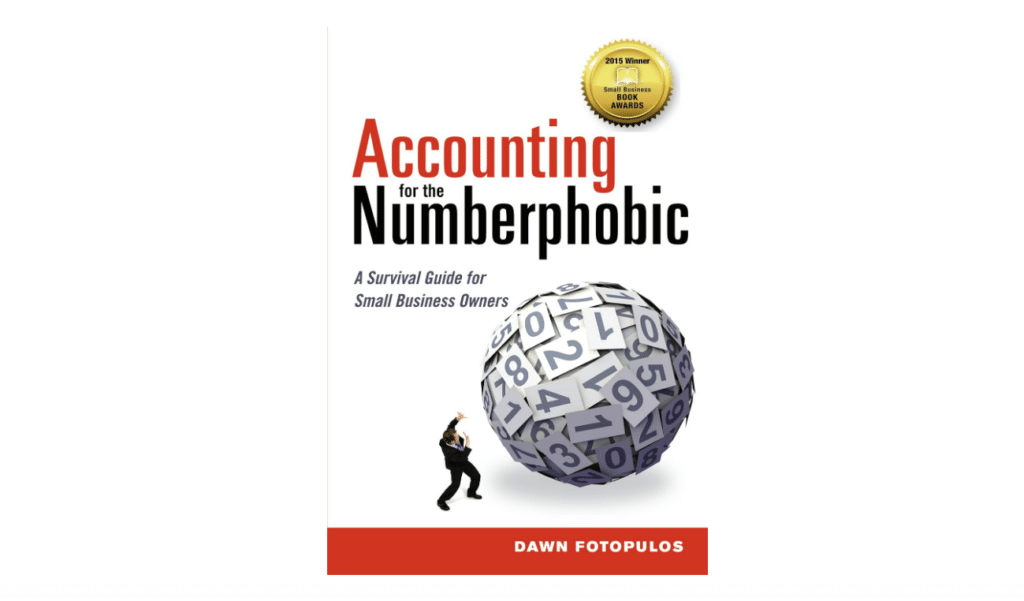
Summary:
In Accounting for the Numberphobic, Dawn Fotopulos provides an indispensable lifeline for small business owners who dread numbers. With empathy and clarity, Fotopulos crafts a guide tailored to those who might shy away from accounting but need to understand it.
What You'll Learn:
The book equips readers with essential skills for managing finances, understanding profit and loss statements, and making informed decisions to ensure the sustainability of their businesses.
Why You Should Read It:
For small business owners who feel overwhelmed by financial jargon and sheets of numbers, this book is a beacon, dispelling the fear and confusion surrounding accounting.
Quote From The Book:
"Numbers tell a story; your job is to understand that story and help it have a happy ending."
About The Author:
Dawn Fotopulos is an award-winning business professor and strategist. Her passion lies in helping business owners conquer their fear of finances. Dive deeper into her insights on LinkedIn and Twitter.
8. Accounting for Non-accountants: The Fast and Easy Way to Learn The Basics by Wayne Label
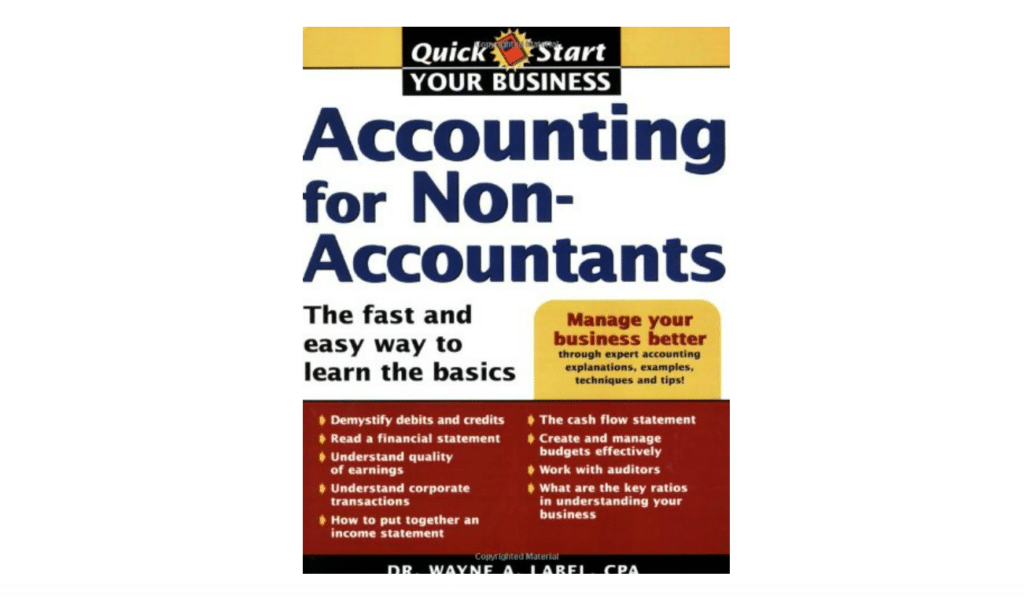
Summary:
Wayne Label presents a concise and clear introduction to accounting principles. With a structured approach, Label demystifies accounting for those without a financial background, making the subject both comprehensible and engaging.
What You'll Learn:
Discover the core accounting principles, from financial statements to the intricacies of debits and credits. Learn to interpret financial data effectively and confidently.
Why You Should Read It:
If you're venturing into the world of business or simply wish to bolster your financial literacy without being bogged down by jargon, Label's guide is your starting point.
Quote From The Book:
"Understanding accounting isn't about mastering complexity; it's about embracing simplicity."
About The Author:
Wayne Label is a seasoned accountant with a flair for teaching. With decades of experience, he bridges the gap between complex financial concepts and everyday understanding. Connect with Wayne on LinkedIn.
9. Accounting QuickStart Guide: The Simplified Beginner's Guide to Financial & Managerial Accounting For Students, Business Owners, and Finance Professionals by Josh Bauerle CPA
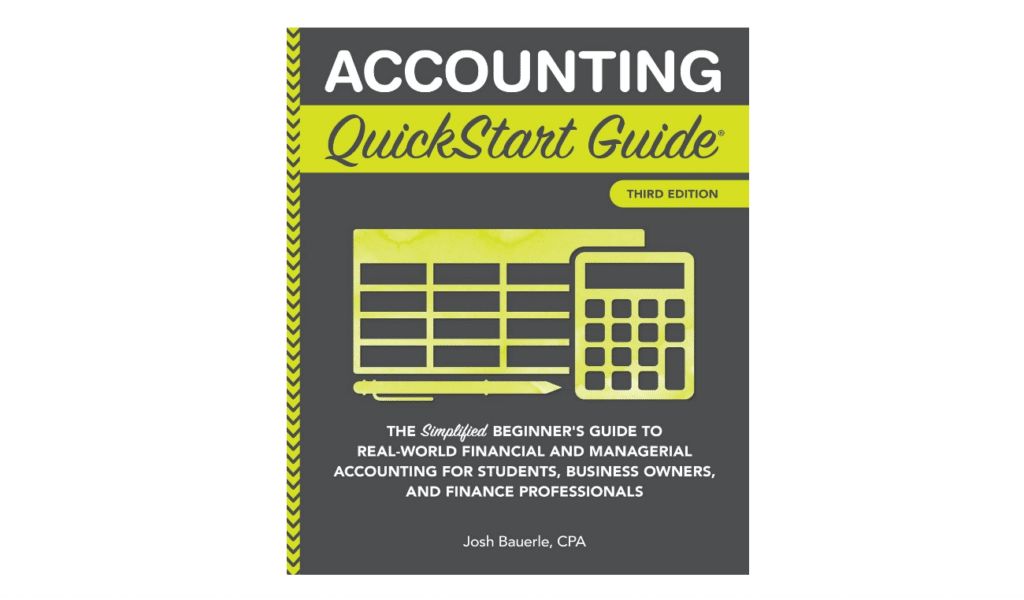
Summary:
Josh Bauerle's Accounting QuickStart Guide is a streamlined manual for anyone seeking a solid foundation in both financial and managerial accounting. Bauerle adopts a direct and simplified approach, making accounting accessible to all.
What You'll Learn:
From understanding balance sheets and income statements to the nuances of managerial accounting practices, this guide covers all the essentials in a digestible format.
Why You Should Read It:
For students, entrepreneurs, or SaaS finance professionals seeking a refresher, Bauerle's guide offers a comprehensive yet concise overview of accounting fundamentals.
Quote From The Book:
"Accounting, when understood, becomes the compass of any successful business journey."
About The Author:
Josh Bauerle, a CPA with a penchant for simplifying the complex, is dedicated to financial education. His vast experience and teaching prowess shine through his writings.
10. Small Business Financial Management Kit For Dummies by Tage C. Tracy and John A. Tracy
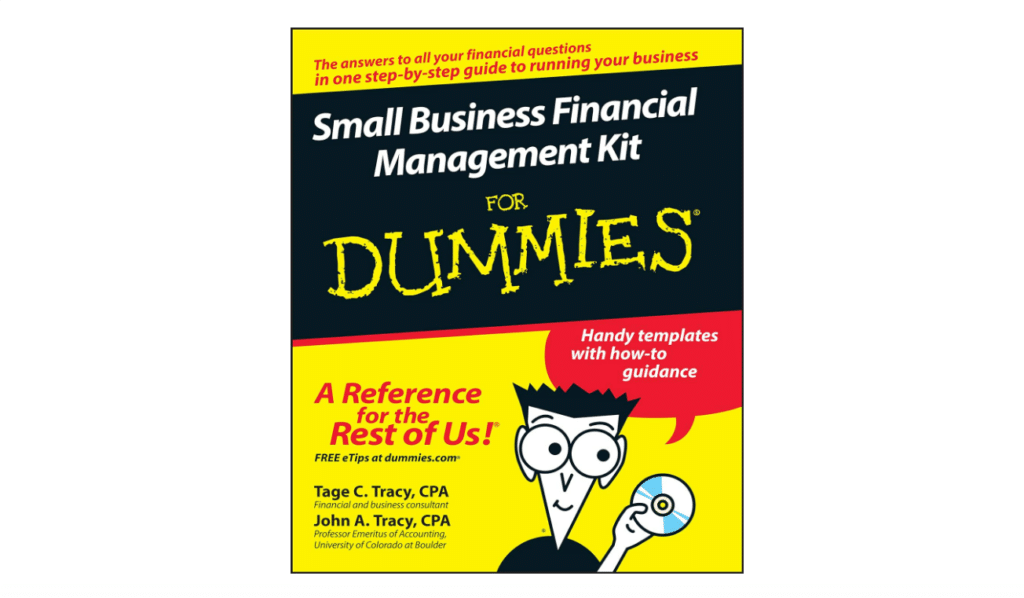
Summary:
This comprehensive guide, crafted by the Tracy duo, serves as an invaluable tool for small business owners. Navigating through financial intricacies, the authors provide tangible strategies to manage, forecast, and analyze small business finances.
What You'll Learn:
Delve into budgeting techniques, financial report analysis, and strategies to manage and forecast your business finances for maximum profitability.
Why You Should Read It:
For small business owners seeking a hands-on approach to financial management, this book offers a blend of theoretical knowledge and practical tools.
Quote From The Book:
"Effective financial management is the foundation upon which successful businesses are built."
About The Author:
Tage C. Tracy and John A. Tracy bring to the table their combined expertise in finance and accounting. Their shared commitment to demystifying financial concepts for business owners is evident in their writings. Connect further on Tage’s LinkedIn profile, and John’s Amazon portfolio.
11. Accounting 101: The Ultimate Guide to Financials that every business owner should master! by Peter Oliver
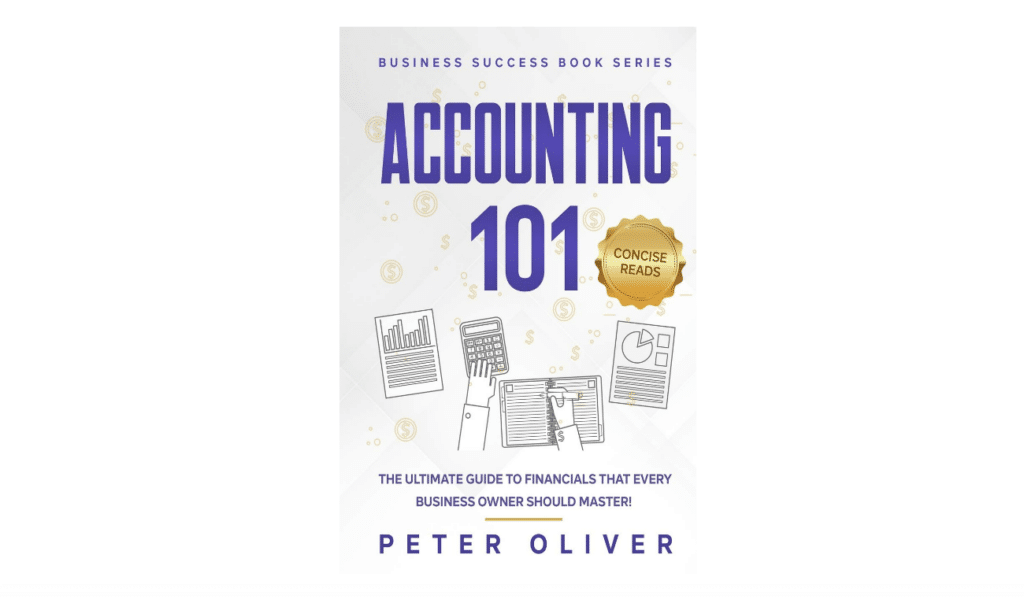
Summary:
In Accounting 101, Peter Oliver unveils the core financial principles every business owner should command. He transforms intricate accounting concepts into digestible insights, making them accessible to all.
What You'll Learn:
From crafting balance sheets to understanding the dynamics of profit and loss statements, get equipped with the knowledge to steer your business finances adeptly.
Why You Should Read It:
Every business owner, regardless of the industry, needs a robust understanding of financials, and Oliver's guide is the perfect foundation.
Quote From The Book:
"Mastering your financials is the first step to mastering your business."
About The Author:
Peter Oliver, a seasoned financial expert, is dedicated to enhancing financial literacy among entrepreneurs. His depth of experience and clear writing style make him a trusted voice in the realm of accounting. Explore more about his works on his Amazon portfolio.
12. Accounting Fundamentals: A Non-Finance Manager's Guide to Finance and Accounting by Shihan Sheriff
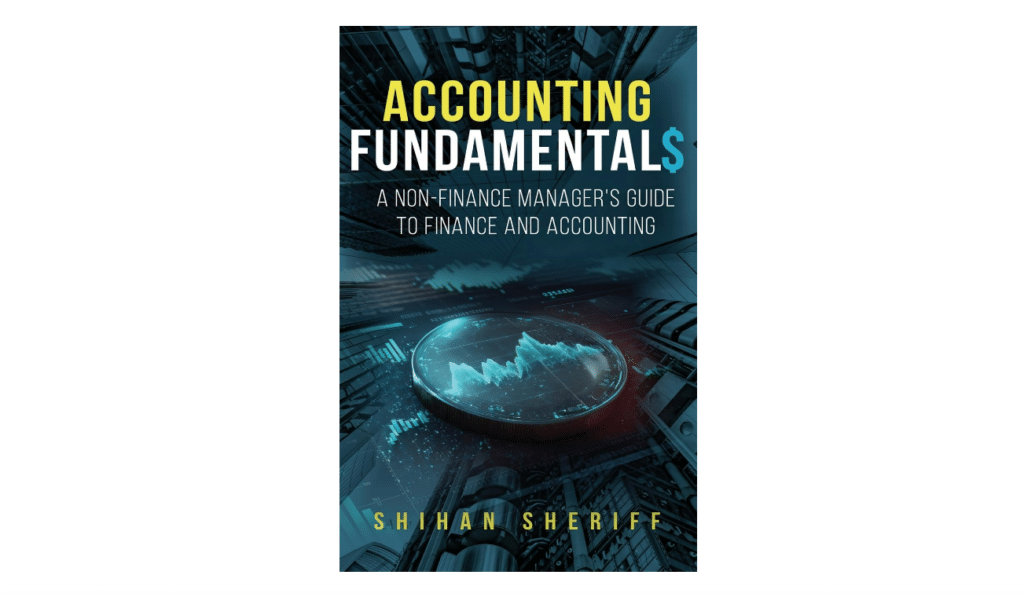
Summary:
Shihan Sheriff's guide offers a lifeline to managers without a financial background. With a clear and engaging style, Sheriff elucidates accounting concepts, ensuring that non-finance managers can confidently navigate financial landscapes.
What You'll Learn:
Grasp essential accounting and finance concepts, understand financial reports, and make informed decisions based on financial insights.
Why You Should Read It:
For non-finance managers aiming to bridge the gap in their financial understanding, Sheriff's guide is an invaluable resource.
Quote From The Book:
"Financial knowledge is not just for accountants; it's a vital tool for every decision-maker."
About The Author:
Shihan Sheriff brings a fresh perspective to financial education, aiming to make accounting accessible to everyone. His dedication shines through his well-crafted guide. Connect with Shihan on platforms such as LinkedIn and Twitter.
13. Accounting for Value by Stephen Penman
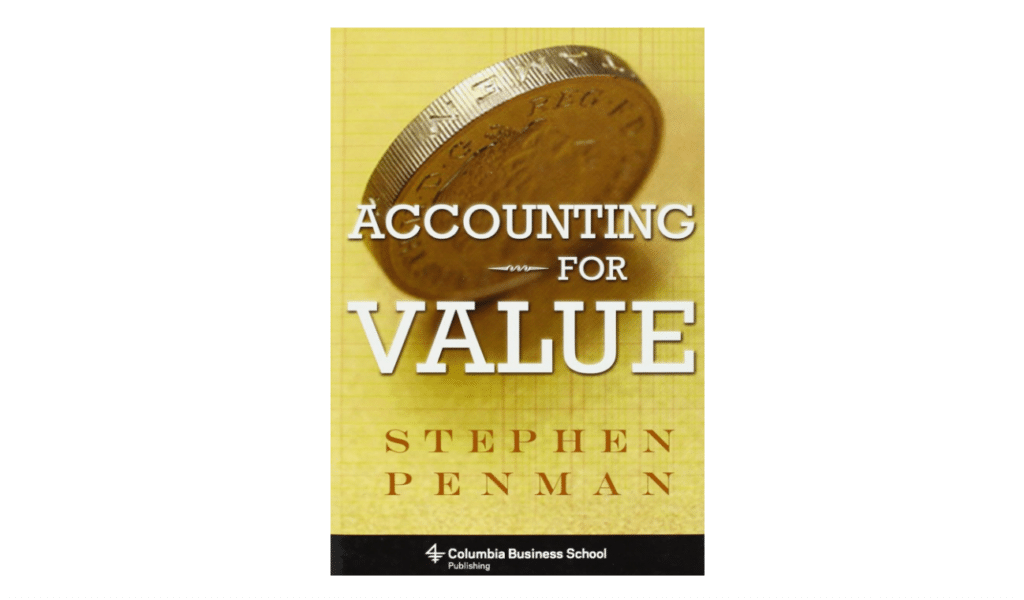
Summary:
Stephen Penman's "Accounting for Value" delves into the nuances of accounting from an investor's perspective, emphasizing the role of accounting in value investing.
What You'll Learn:
Grasp the principles of how accounting can be employed to inform investment decisions, identify undervalued stocks, and navigate the financial markets with an informed lens.
Why You Should Read It:
For those vested in the world of investments, understanding the intricate dance between accounting and value becomes paramount. Penman’s guide offers this clarity.
Quote From The Book:
"Accounting, when understood deeply, is the investor's foundational tool for value realization."
About The Author:
Stephen Penman is a respected figure in the realms of finance and academia. His research and teachings have influenced generations of financial thinkers. Discover more about his works on his Amazon portfolio.
14. Financial Shenanigans, Fourth Edition: How to Detect Accounting Gimmicks and Fraud in Financial Reports by Howard Schilit, Jeremy Perler, and Yoni Engelhart
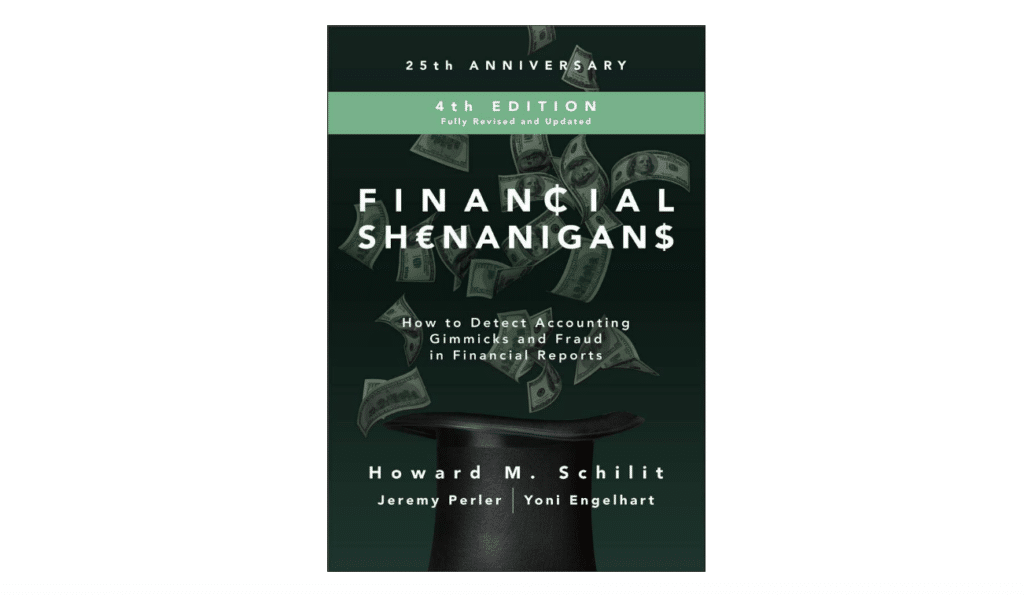
Summary:
This groundbreaking work explores the dark corners of financial reporting, equipping readers with tools to identify misleading accounting practices and financial statement frauds.
What You'll Learn:
Understand the red flags in financial statements, discern potential accounting gimmicks, and develop a skeptical approach to financial report analysis.
Why You Should Read It:
In an era where transparency is vital, having the skills to discern factual reporting from manipulative practices is invaluable for professionals in finance.
Quote From The Book:
"Beyond the numbers lies a story; sometimes it's a fiction crafted by deception."
About The Authors:
Howard Schilit, Jeremy Perler, and Yoni Engelhart form a powerful trio in the field of financial analysis and fraud detection. Their combined expertise has been instrumental in shining a light on the shadowy facets of financial reporting. Connect with Howard on LinkedIn, engage with Jeremy's expertise on LinkedIn, and delve into Rohit's contributions on his LinkedIn.
15. Bookkeeping All-in-One For Dummies by Lita Epstein and John A. Tracy
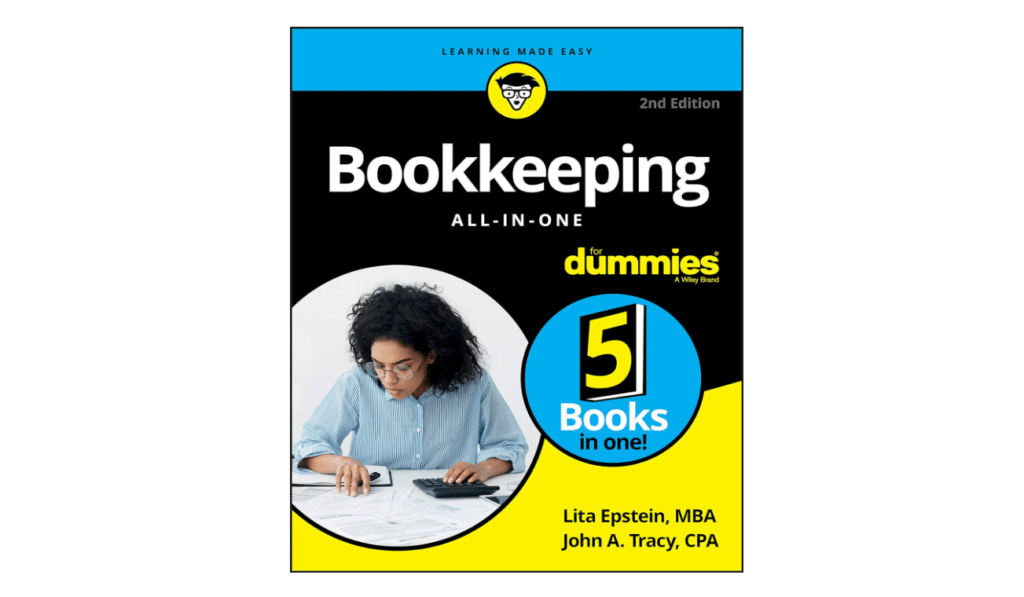
Summary:
An encompassing guide to bookkeeping, this tome by Epstein and Tracy breaks down complex topics into easily understandable segments, making the world of debits and credits accessible to all.
What You'll Learn:
Master the art of maintaining financial records, understanding financial statements, and the intricacies of day-to-day bookkeeping practices.
Why You Should Read It:
Whether you're a small business owner or an individual looking to manage finances better, this guide lays down the groundwork for efficient bookkeeping.
Quote From The Book:
"Behind every successful business is a robust bookkeeping system."
About The Authors:
Lita Epstein and John A. Tracy, both titans in the world of finance and accounting, come together to simplify bookkeeping for the masses. Their collective wisdom is a boon for readers. Connect with Lita on LinkedIn and discover more about John’s works on Amazon.
16. Accounting Best Practices by Steven M. Bragg
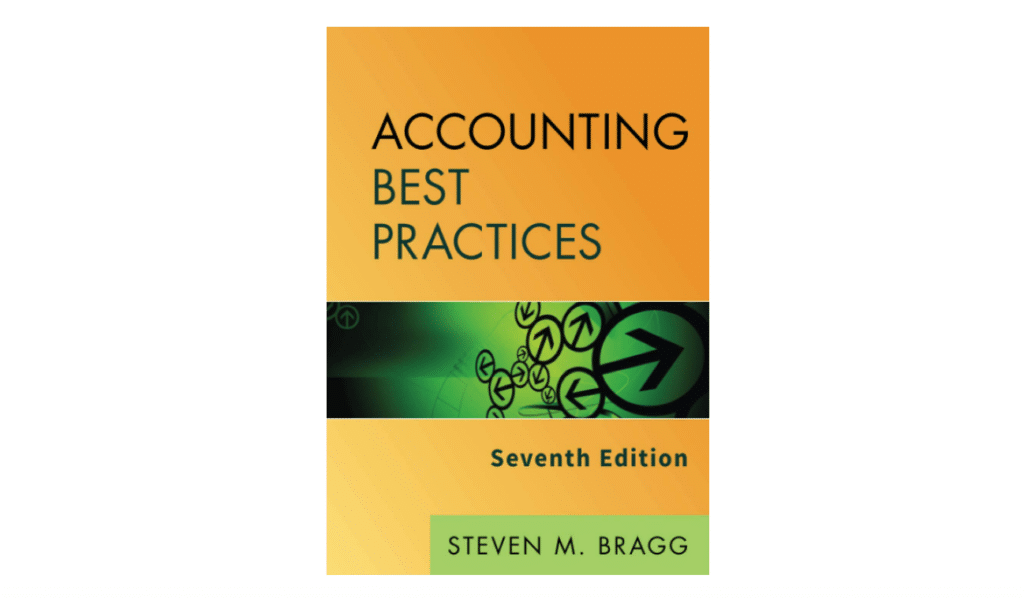
Summary:
In "Accounting Best Practices," Bragg distills decades of experience to present proven and efficient methods that enhance the accounting function of any organization.
What You'll Learn:
Discover a myriad of techniques and strategies that streamline the accounting process, improve accuracy, and elevate the overall efficiency of the financial function.
Why You Should Read It:
Bragg’s guide is an essential read for accountants and finance professionals who aspire to modernize their practices and stay ahead in a rapidly evolving field.
Quote From The Book:
"In the ever-evolving world of accounting, adaptability and continuous learning remain paramount."
About The Author:
Steven M. Bragg’s vast experience in accounting has positioned him as an industry thought leader. His contributions extend beyond books, benefiting professionals and organizations alike. Explore more about his works on his Amazon portfolio.
17. Profit First: Transform Your Business from a Cash-Eating Monster to a Money-Making Machine by Mike Michalowicz
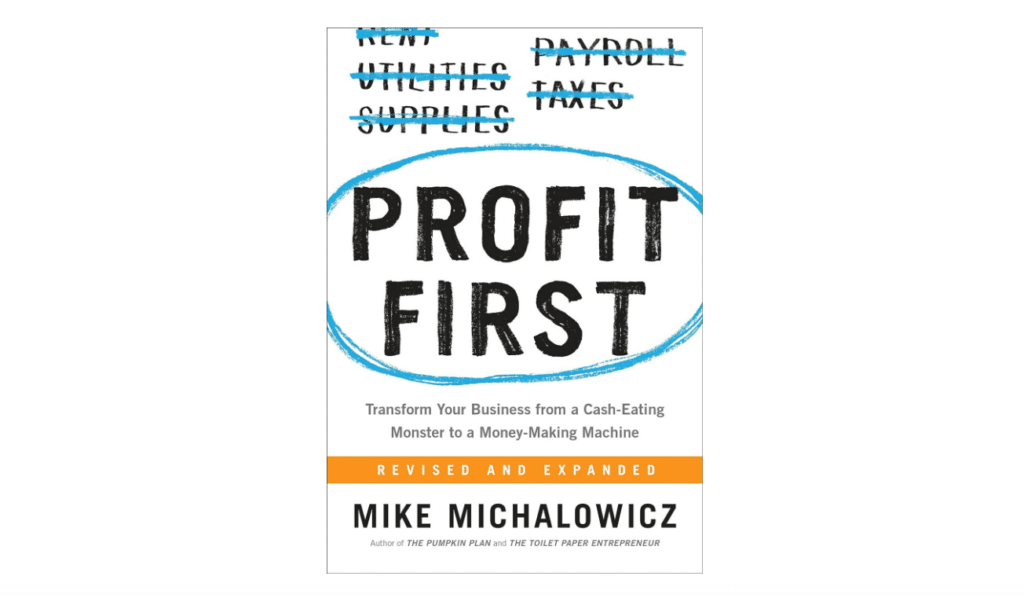
Summary:
Michalowicz flips traditional accounting on its head with "Profit First." He introduces a straightforward system that ensures profitability, making businesses thrive sustainably.
What You'll Learn:
Learn the innovative "Profit First" method, a cash management system that redefines traditional accounting, emphasizing profit generation from the get-go.
Why You Should Read It:
For entrepreneurs and business owners tired of the feast-famine cycle, Michalowicz offers a refreshing approach that guarantees consistent profitability.
Quote From The Book:
"Profit isn’t an event; it’s a habit. Make it a part of your business's DNA."
About The Author:
Mike Michalowicz, an entrepreneur at heart, is on a mission to eradicate entrepreneurial poverty. His fresh perspectives on business finance have transformed countless businesses. Engage with Mike on LinkedIn, Twitter, and his personal website.
Which Accounting Books for Beginners Do You Recommend?
If there are accounting gems you believe should be on this list, I'd love to hear your recommendations. Feel free to suggest titles I might have overlooked. Your insights are always valued.

